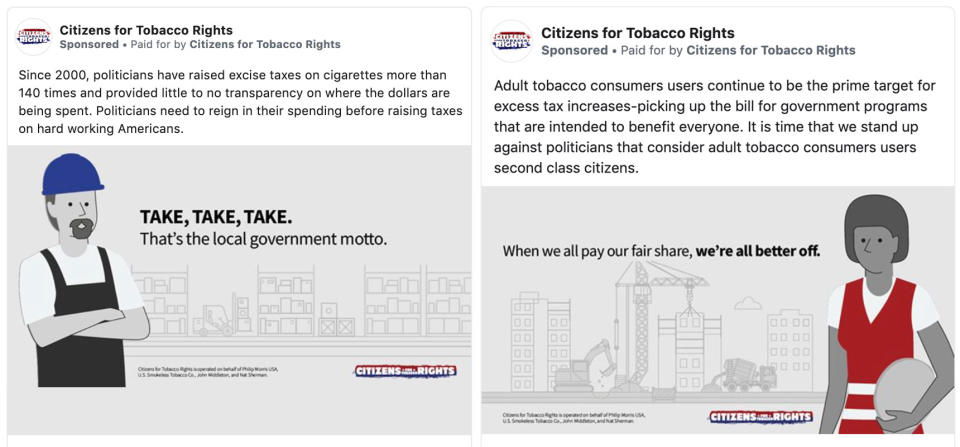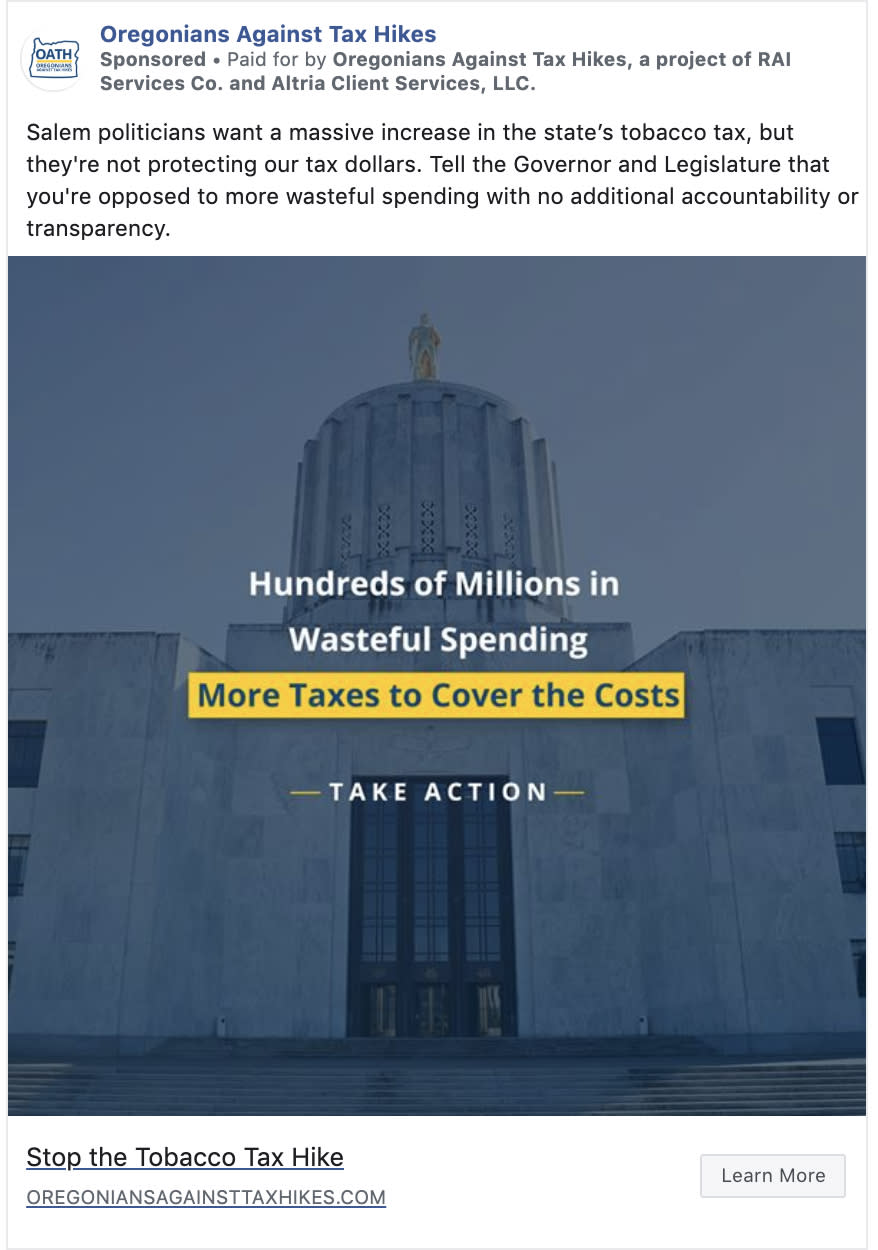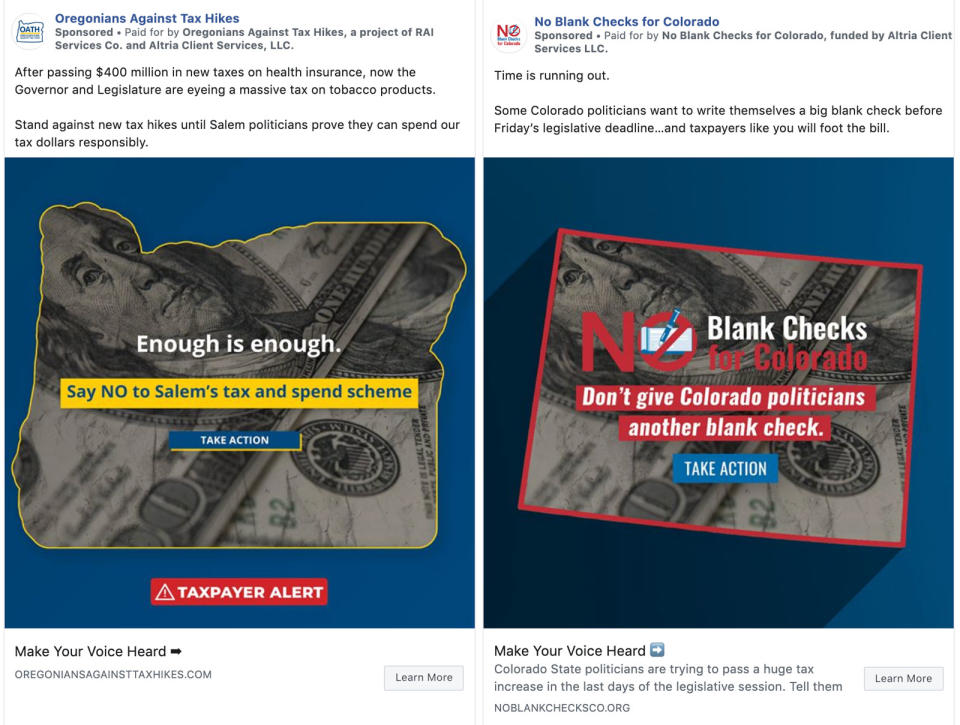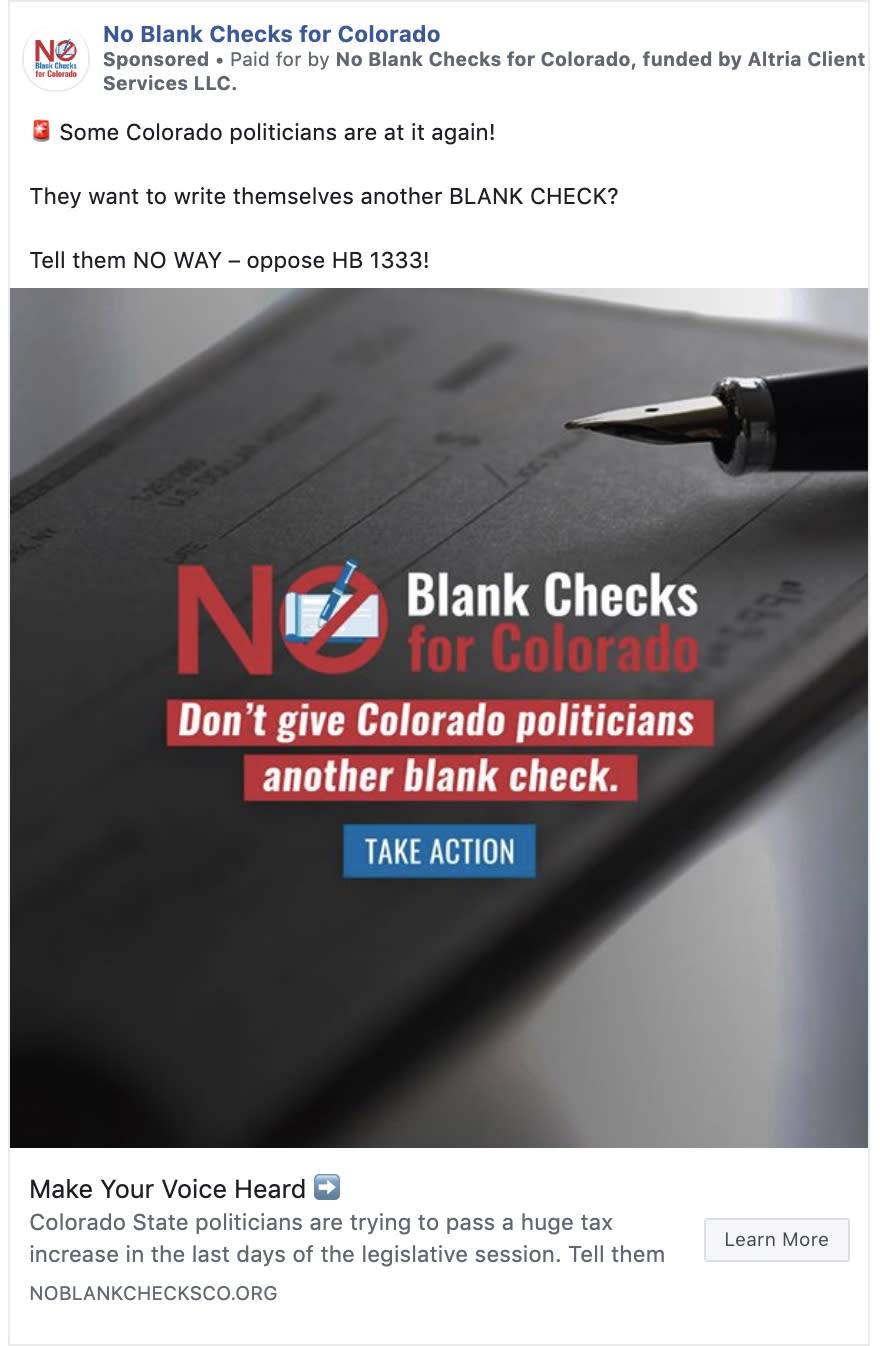Big tobacco keeps starting 'grassroots' Facebook campaigns
By fighting taxes, users are handing their details over to tobacco companies.
This article was produced in partnership with Point, a YouTube channel for investigative journalism.
Facebook groups like 'Oregonians Against Tax Hikes' and 'No Blank Checks for Colorado' look like citizen groups concerned about taxes. But after a few months running extensive Facebook ad campaigns, they recede with members' petition signatures and personal data. They also happen to be owned and operated by tobacco companies.
"[Tobacco companies] create these groups to oppose efforts to pass laws either through legislatures or especially through ballot measures," explains Vince Willmore, Vice President of Communications for the Campaign for Tobacco-Free Kids. "Every time there's a ballot measure to increase a tobacco tax or pass a smoke-free air law, they'll come up with a front group with a great sounding name when it's entirely funded and run by the tobacco companies."

Tobacco companies are skilled at using Facebook's powerful ad platform to micro-target voters, pushing them to sign online petitions. Companies then gain signees' addresses, email addresses and phone numbers, and open a line of communication through their new relationship with concerned citizens. These relationships are valuable to tobacco companies in an industry fighting increased taxes and regulation.
In response to a recent bill in Oregon (HB 2270) that would increase taxes on cigarettes by $2, require cigarettes and certain cigars to be sold in packs of 20 or more and tax vaping and e-cigarettes like other tobacco products, the group Oregonians Against Tax Hikes (OATH) was created on Facebook on March 22, 2019.
A closer look at the fine print shows that this group and its ads were "a project of RAI Services Co. and Altria Client Services, LLC."
RAI Services Co. is a subsidiary of Reynolds American Inc – the second largest tobacco company in the US. Altria Client Services, LLC is a service company for the Altria Group whose operating companies include Philip Morris USA, Nat Sherman, U.S. Smokeless Tobacco Co., and John Middleton.
So what appears to be a local group of concerned citizens is actually a lobbying campaign funded by Big Tobacco.
OATH has spent $68,311 on 89 targeted Facebook ads since April this year, ads like this:

These ads took viewers to a website with a pledge to be sent to legislators. While OATH sent signatories' emails to legislators, they did not submit the list of signatures as public testimony during the bill's hearings. In fact, some legislators like Representative Bill Post, who voted against the bill, said they were not familiar with the group or their pledge.

Similarly, the group No Blank Checks for Colorado's petition against HB 1333 (a ballot initiative for increased tobacco taxes) was not delivered during public hearings.
It's common for businesses and groups to enter testimony or letters into the public record. In Oregon, Plaid Pantry Convenience stores submitted testimony opposing HB 2270 in April and again in June. In Colorado, the Rocky Mountain Smoke-Free Alliance had one person testify against HB 1333 in April and four more people testify against it in May.
While auto-generated emails were sent to individual legislators, no public testimony was given or submitted by anyone representing OATH or No Blank Checks for Colorado.

"What the tobacco companies are trying to hide is that they are the ones behind these front groups," explains Willmore from the Campaign for Tobacco-Free Kids. "They may think they are more likely to be scrutinized and exposed if they submit comments under their front group names during public hearings or through testimony. Individual letters to legislators are more under the radar."
Furthermore, neither Oregonians Against Tax Hikes nor No Blank Checks for Colorado make any promises on their websites that they won't use, share or sell the data they collect.

A 2016 study of tobacco industry email marketing by the Association of Nonsmokers-Minnesota and ClearWay Minnesota found that tobacco companies cross-promoted other products and causes to those in their email marketing databases. People in their study who had signed up for marketing materials from various tobacco brands received emails from the group Citizens for Tobacco Rights, which is "operated on behalf of Philip Morris USA, U.S. Smokeless Tobacco Co., John Middleton, and Nat Sherman."
As the study's authors say: Direct email marketing is a way for tobacco companies to avoid restrictions on public tobacco advertisements.
On OATH's website, the group amassed 6,788 signatures on their pledge against the state's tax hikes. Looking at just the cost of Facebook ad placements ($68,311), that works out to just over $10 spent per person who signs on.
Tobacco companies spent $29 per person on marketing in the US in 2016
According to the Centers for Disease Control and Prevention, cigarette and smokeless tobacco companies spent $29 per person (including children) on marketing in the US in 2016 and $250 per smoker.
Despite Facebook's ad policies prohibiting ads that promote the sale or use of tobacco products, political ads are allowed. Getting people to a website where they input their data in opposition to a piece of legislation is a convenient way to collect personal data without selling or promoting the use of tobacco.
Point and Engadget asked Facebook if these advertisements violate its policies on tobacco advertising, but it didn't officially respond to our request for comment by the time of publishing.

The strategy of creating front groups -- known as astroturfing -- is not new. Groups like North Dakotans Against the 400% Tax Increase, Californians Against Unaccountable Taxes, and Missourians Against Tax Abuse have been created for various efforts to fight anti-tobacco legislation since the 2000s.
Most of these groups' websites or Facebook pages no longer exist. Those that do, like OATH and No Blank Checks for Colorado, were set up recently -- in March and April 2019, respectively. Often, these groups will be set up when a legislative issue comes up and disappear after it has been resolved.
Tellingly, groups like this list no organization members, no grassroots organizers and no staff on their websites. They also rarely post on Facebook, preferring instead to use targeted Facebook ads that will only be seen by selected sections of the population. OATH has only two Facebook posts but nearly 90 ads, and No Blank Checks for Colorado has three posts with nearly 60 ads.
Veiled as anti-tax groups, their focus is really on taxes that affect tobacco prices. While OATH had a lot to say about the proposed tax increase on tobacco products, it made no mention of a proposed cellphone fee, a commercial activities tax or a carbon cap-and-trade tax bill in Oregon this legislative session.
Veiled as anti-tax groups, their focus is really on taxes that affect tobacco prices
This type of astroturfing and data-collection is not confined to tobacco companies. But for an industry that is restricted by tough marketing regulations in the US, this is a potentially lucrative loophole.
When asked for comment about these practices, RAI Services Co. said, "Oregonians Against Tax Hikes (OATH) is a 501c4 organization formed by Altria Client Services, LLC and RAI Services, Inc, to advocate against exorbitant tax hikes on tobacco products in Oregon.
"All messages sent by constituents through the OATH website clearly state that the signees oppose tax increases on tobacco products in the state, and RAI and Altria's interest is disclosed on the OATH website and throughout display advertising ("a project of RAI Services Co. and Altria Client Services, LLC."). Personal information sent through OATH to contact legislators is not used for tobacco product marketing."
Altria Client Services, LLC did not respond to our request for comment.
Wilmore, however, believes that tobacco companies are being purposefully deceptive when it comes to these dummy campaign groups.
"They are working to recruit people to sign up in support of these great sounding groups," Wilmore explained. "People are doing it without really realizing that really they're giving their name and information to the tobacco industry."


